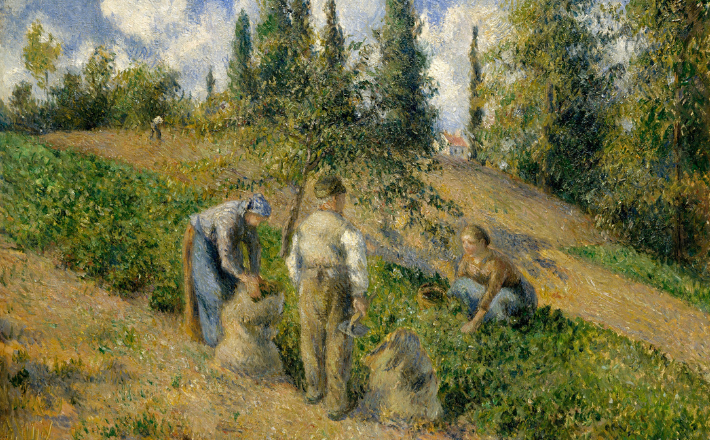Commentary on 2 Kings 5:1-14
In 2 Kings 5:1–14, the biblical writers recount the story of a military leader’s encounter with the prophet Elisha. This story is part of the larger arc of the ancient Israelites’ narrative history. After the death of King Solomon and the establishment of the northern and southern kingdoms (1 Kings 12:1–16:34), Elijah emerges as the preeminent prophet of Israel. In 2 Kings 2, Elijah transfers his prophetic mantle to Elisha, who performs miracles for a widow, raises a Shunamite’s son from the dead, and miraculously cleanses some stew during a famine (2 Kings 4) before he encounters Naaman in the fifth chapter of 2 Kings.
Reading beyond the action of our focal text, Elisha goes on to perform more miracles, and finally, the narrative arc telescopes in on the final stages of the division of the united kingdom (Israel and Judah), which eventuates in the Babylonian exile, beginning in 2 Kings 8:16. Because the story is part of the section of the Bible that includes the accounts of the prophets Elijah and Elisha (1 Kings 17:1–2 Kings 8:15), it is easy to understand this passage as being about Elisha.
Elisha figures prominently in 2 Kings 5; however, this is really a story about Naaman because he is the only character who experiences a change in the narrative. Neither the king of Aram, nor his wife, nor her servant girl experiences a change in their physical state or their perspective: The king and his wife do not travel or experience any change in their body, and the servant girl seems to have believed in the power of the Israelite prophet all along.
The king of Israel is momentarily flustered, but he is not moved to action. Elisha speaks but never moves. It seems the prophet does not leave his quarters to encounter his visitor or to perform the miracle. And Naaman’s servants simply encourage him to do what is asked of him: to go wash in the Jordan seven times (2 Kings 5:10). Only Naaman relocates and is transformed. At the beginning of the story, Naaman has a skin disease, so he travels to Samaria and eventually immerses himself in the Jordan River. The story resolves with the restoration of Naaman’s skin.
Wisdom: The unusual suspect
Naaman’s restoration is a miracle story that almost did not happen. The king of Aram’s military leader has a skin disease, and an Israelite servant girl, who was undoubtedly conscripted into service after an Aramean triumph over the Israelites, suggests to the military leader’s wife that a specific Israelite prophet can cure the condition (2 Κings 5:2–3). With the foreign servant girl’s lack of status and standing in the Aramean community, it was unlikely anyone connected to the king would listen to her. Yet, but for the wisdom of the servant girl, Naaman’s miracle would not have happened. The king of Aram does send Naaman to Samaria for his healing, with a letter of introduction.
The letter, however, miscommunicates the purpose of Naaman’s journey. Instead of explaining that Naaman has come to Samaria seeking a solution from the prophet, the Aramean king penned, “… that you [the king] may cure him of his leprosy” (2 Kings 5:6). Upon reading the letter, the king of Israel is angered by the suggestion that he has the power to kill and resurrect. The king receives the letter as a signal that the king of Aram seeks to quarrel with him. At the end of verse 7, Naaman’s resolution is uncertain because the Israelite king (as the literal gatekeeper of the area) could refuse Naaman access to his region and, by extension, to the prophet.
Only because Elisha learns of the king’s response does he send word to the palace, encouraging the king to direct Naaman to him. Again, Naaman’s miracle almost did not happen.
Then, Naaman almost blocks the miraculous blessing himself. When he is not greeted by the prophet but by the prophet’s messenger, Naaman is offended. Perhaps as a commander of the king’s army, who would appreciate deference and protocol, Naaman feels insulted by the prophet’s deployment of a proxy to give the miracle-working instructions. Naaman is so angry that he turns away, saying, “I thought that for me he would surely come out, and stand and call on the name of the LORD his God, and would wave his hand over the spot, and cure the leprosy!” (2 Kings 5:11).
Naaman wants an audience with the prophet and expects more fanfare than simple instructions to bathe in a common river. Offended, he almost misses his miracle. Were it not for his nameless servants, who encourage him to follow the prophet’s directions, Naaman would indeed have missed his blessing because it came packaged in a way that did not meet his expectations (2 Kings 5:13–14).
As modern-day believers, we should pay close attention to what happens in 2 Kings 5. This story reminds us that wisdom may present as an unusual suspect. Indeed, the wisdom in 2 Kings 5 comes from individuals who are not central to the narrative or authoritative in the community. On the contrary, the individuals trusted to make wise decisions for the community do not display wisdom. The king of Aram miscommunicates his request, and the king of Israel responds in ways that almost foreclose on Naaman’s ability to access the prophet. The servants are the wise individuals in this narrative. The servant girl wisely suggests a visit to the Israelite prophet, and the servants of Naaman wisely encourage him to follow the prophet’s instructions.
How often do we almost miss our miracle because we do not trust the package it comes in? How often have we not received the recommendation of someone we thought could not possibly know what they were talking about? How many times have others blocked our blessings because their emotions got in the way? How often do we discount how God may have worked in our lives? Not all miracles come with fanfare. At some point, like Naaman, we have to be obedient to the nonsensical for our conditions to change. We may have to inconvenience ourselves. We may even need to rely upon those we conscript to join us on our journey.


July 6, 2025